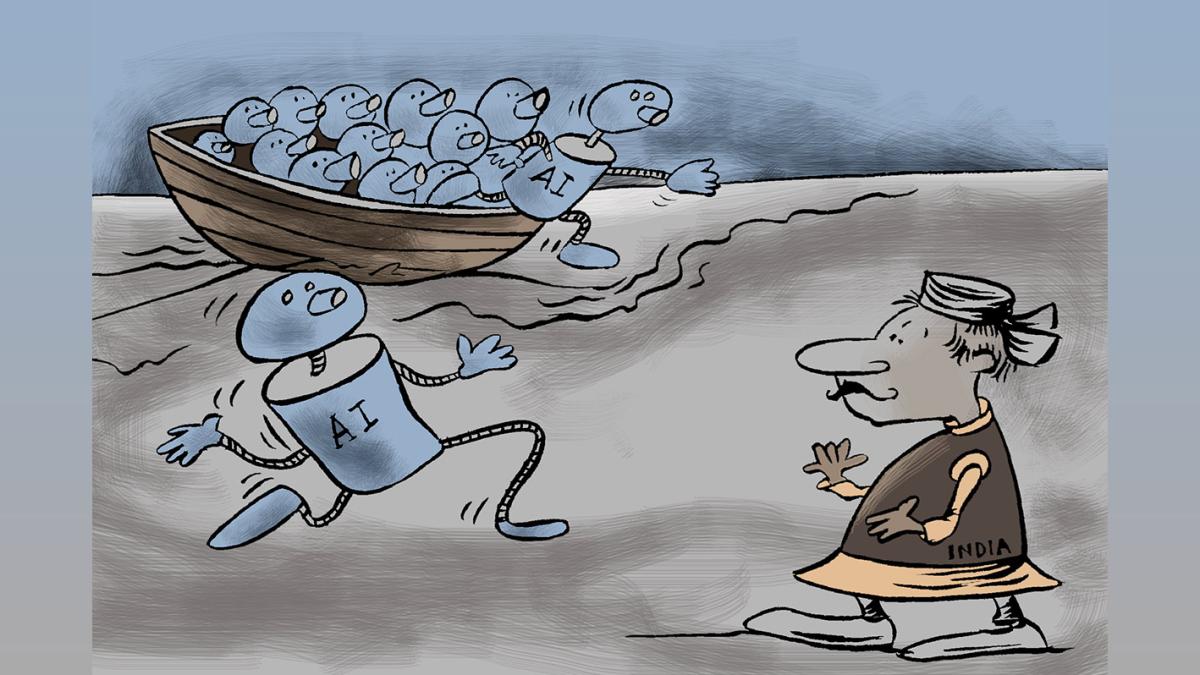Tech Infra: Top GenAI Challenge for Businesses - PwC Report
PwC report highlights tech infrastructure readiness as a major hurdle for businesses implementing Generative AI (GenAI) solutions, along with data availability and skilled workforce challenges.

Illustration: Uttam Ghosh/Rediff.com
New Delhi, Sep 25 (PTI) Tech infrastructure readiness is one of the top three challenges organisations in the technology, media, and telecom (TMT) sector face when implementing Generative AI (GenAI) solutions, a report stated.
The report by PwC India revealed that infrastructure readiness issue arises because TMT companies often need to invest in new technologies and infrastructure, which can sometimes require a complete overhaul.
"While GenAI has the potential to revolutionise the way the telecom sector operates, interacts with the customers and delivers services, a whopping 90 per cent of telecom companies have recognised integrating complexities while implementing GenAI as a key deterrent, emphasising how integrating new systems with existing ones can be complex and time-consuming," the report noted.
Technology and media sectors also face similar constraints, the report which draws insights from over 100 C-suite executives and senior leaders involved in functions such as IT, operations and marketing across the TMT sector.
Implementing resource-intensive GenAI solutions mostly requires extra computational resources and sophisticated algorithms. If these heightened resource demands are not met, they can restrict the scalability and efficiency of GenAI systems, it said.
Other key challenges faced by enterprises while implementing and integrating GenAI in their operations include data availability and readiness, lack of access to skilled workforce, leadership alignment and lack of proven use cases.
Moreover, concerns over control, safety, and accountability of the technology are also prominent.
"Companies are grappling with several significant challenges, including addressing ethical considerations such as bias and discrimination, preventing misuse and overuse, safeguarding data privacy and copyright protection, and ensuring transparency and explainability in complex algorithms," the report said.
In light of these challenges, companies and their boards are facing increasing pressure from regulators and shareholders to create internal structures for AI governance. Although some common frameworks are starting to take shape, their adoption on a large scale is still quite limited, PwC noted.
The report by PwC India revealed that infrastructure readiness issue arises because TMT companies often need to invest in new technologies and infrastructure, which can sometimes require a complete overhaul.
"While GenAI has the potential to revolutionise the way the telecom sector operates, interacts with the customers and delivers services, a whopping 90 per cent of telecom companies have recognised integrating complexities while implementing GenAI as a key deterrent, emphasising how integrating new systems with existing ones can be complex and time-consuming," the report noted.
Technology and media sectors also face similar constraints, the report which draws insights from over 100 C-suite executives and senior leaders involved in functions such as IT, operations and marketing across the TMT sector.
Implementing resource-intensive GenAI solutions mostly requires extra computational resources and sophisticated algorithms. If these heightened resource demands are not met, they can restrict the scalability and efficiency of GenAI systems, it said.
Other key challenges faced by enterprises while implementing and integrating GenAI in their operations include data availability and readiness, lack of access to skilled workforce, leadership alignment and lack of proven use cases.
Moreover, concerns over control, safety, and accountability of the technology are also prominent.
"Companies are grappling with several significant challenges, including addressing ethical considerations such as bias and discrimination, preventing misuse and overuse, safeguarding data privacy and copyright protection, and ensuring transparency and explainability in complex algorithms," the report said.
In light of these challenges, companies and their boards are facing increasing pressure from regulators and shareholders to create internal structures for AI governance. Although some common frameworks are starting to take shape, their adoption on a large scale is still quite limited, PwC noted.
You May Like To Read
TODAY'S MOST TRADED COMPANIES
- Company Name
- Price
- Volume
- Vodafone-Idea
- 11.96 (+ 5.75)
- 113885452
- Sylph-Industries
- 0.77 ( -1.28)
- 51063360
- Mangalam-Industrial
- 0.90 ( -1.10)
- 39473361
- Shish-Industries
- 14.02 ( -9.96)
- 38945873
- Ola-Electric-Mobilit
- 34.40 (+ 9.97)
- 38895972






